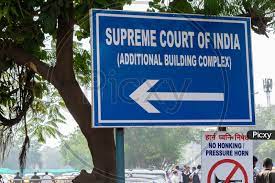The broad issue at hand relates to recruitment and appointment to the posts in the Haryana Civil Service (Para 2)
Dinesh Singh (Respondent no. 1) was one among several candidates, who was seeking appointment to the post in the Service. He was appointed in the Department of Revenue and Disaster Management (Appellant no. 3; hereinafter, ‘the Department’) on 12.08.2008 as a Naib Tehsildar, and at the time of filing the original Writ Petition, was serving in the post of Tehsildar. The Department has found Dinesh Singh, among several others, to be ineligible for selection to Register A-1 on the ground that he did not satisfy the eligibility condition set out in sub clause (iii) of clause (a) of Rule 9. Rule 9 (a)(iii) reads as follows:
“is not facing disciplinary proceedings and against whom action is not being contemplated”. (Para 6)
Whether disciplinary proceedings were ‘contemplated’ against Mr. Dinesh Singh as on date of consideration, that is, 31.08.2019 (Para 31)
The reason for declaring the Respondent (Dinesh Singh) ineligible for selection as per Rule 9 was on the ground that ‘decision has been taken on file to charge sheet him under Rule 7’11. At no point has it been asserted by Dinesh Singh (Respondent no. 4) that disciplinary proceedings were not contemplated against him. His entire case from the very beginning has been that the cut-off date qua all eligibility conditions must be determined as on 01.11.2018 and since there was no decision/contemplation to initiate any disciplinary proceedings as of that date, he ought to have been recommended for appointment. In fact, in the Counter-Affidavit submitted on his behalf, there is an implicit admission that a decision to initiate disciplinary action against him (Dinesh Singh) was taken on 09.01.2019. (Para 47)
The main allegation against Respondent No.1 is that on 05.01.2019 and 06.01.2019, he was directed to act as Duty Magistrate during the Haryana Teacher’s Eligibility Test, 2018 and he remained absent from this duty and as such he was negligent in performing his official duties. The Deputy Commissioner, Kurukshetra wrote a letter dated 9.01.2019 to the Additional Chief Secretary and Finance Commissioner, Government of Haryana, Department of Revenue and Disaster Management in this regard and recommended that formal inquiry be initiated against the Respondent. In view of this communication, a decision was taken on 05.02.2019 to charge-sheet Respondent No. 1. It is not relevant for us to consider what happened beyond the date of consideration, that is, 31.08.2019. However, it may be recorded here that subsequent to this date, there was a chargesheet issued against the Respondent and ultimately, the entire proceedings came to be dropped on 11.12.2019. Since the eligibility conditions in Rule 9 (1)(a)(iii), the validity of which is not under challenge before us, requires us to limit our inquiry into the question of eligibility as on date of consideration, what happens after that becomes insignificant to the inquiry. (Para 49)
In the background of the above facts and position of law analysed hereinabove, it has to be concluded that as on the date of consideration, disciplinary action was contemplated against the writ petitioner Dinesh Singh, and therefore he was rightly held to be ineligible for selection of his name in Register A-1. (Para 50)
SUPREME COURT OF INDIA
2023 STPL(Web) 488 SC
[2023 INSC 1070]
State Of Haryana And Others Vs. Dinesh Singh And Another
Civil Appeal No. 8142 of2023 (@ Special Leave To Appeal (C) No. 21335 of 2022)-Decided on 14-12-2023
https://stpllaw.in/wp-content/uploads/2024/01/2023-STPLWeb-488-SC.pdf







